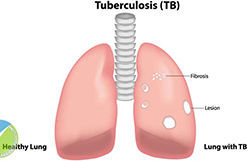Here are some key facts to know about this contagious disease, caused by bacteria called Mycobacterium tuberculosis.
How does tuberculosis affect the body?
Tuberculosis mainly affects the lungs, but it can affect any organ in the body including bones, brain, intestines, lymph nodes, skin, serous membranes surrounding organs like pleura and peritoneum.
What are the signs and symptoms of TB?
Common symptoms of TB include - chest pains, weakness, weight loss, coughing up of blood, fever night sweats.
Who's at risk?
All age groups are at risk of TB, however, it mostly affects adults in their most productive years. You're more likely to get TB if you have any of the following conditions -
HIV/AIDS
Diabetes
Severe kidney disease
Cancer
Babies and young children are also vulnerable to Tb since their immune systems are not fully developed.
It is curable?
With regular and complete treatment, TB is a curable disease. So never miss a dose.
Preventive measures
Leading a healthy lifestyle is crucial for preventing TB. There are some general preventive measures that can be taken -
Eating a healthy diet with plenty of fruit, vegetables, whole grains and lean meat while avoiding fatty, sugary and processed foods.
Being physically active.
Not smoking.
Cutting down on alcohol intake.
Maintaining a good personal hygiene.
Avoiding crowded places, especially, whe you are not well.
Isolating infected people till they are bacteriologically negative.
In order to build public awareness about the global epidemic of tuberculosis (TB) and efforts to eliminate the disease, World Tuberculosis Day is observed on March 24 each year.
Tuberculosis, the world’s top infectious disease killer, claims 5 000 lives each day.
According to the Global Tuberculosis Report 2016 by the World Health Organisation, India accounts for "one fourth of the global TB cases with 2.2 million out of 9.6 million total cases.
